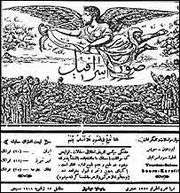Sur-e Esrafil (magazine)
 | |
| Categories | Politics, Satire |
|---|---|
| Frequency | Weekly |
| Publisher | Mirzā Jahāngir Khān |
| First issue | 30 May 1907 |
| Final issue | 8 March 1909 |
| Country | Iran |
| Based in | Tehran |
| Language | Persian |
| Website | Sur-e Esrafil |
The Persian weekly journal Sur-e Esrafil (Persian: صور اسراقیل; DMG: Ṣūr-e Esrāfīl; English: “Trumpet of Esrafil“) was published between May 1907 and March 1909. The first 32 issues were published by the founder of the journal, Mirza Jahangir Khan (1870-1908), an Iranian author and journalist. With its liberal as well as revolutionary orientation Sur-e Esrafil contributed significantly to support the Constitutional Revolution. The editor published articles criticising strongly the high-class and the social situation of the country that time and discussing controversial between conservatives and modern religion.[1] But the journal became well-known and famous due to its literary satirical elements. Ali Akbar Dehkhoda (1879-1956) was responsible for the satirical articles of the column „Charand-o Parand“ („Nonsense“). He had a simple linguistic style in contrast to the rather literary style addressing the educated people. In this way he wanted to reach the majority of the population and to address the daily problems of the common people.[2]
During the repressions and on the command of Mohammad Ali Shah the journal was finally suspended in June 1908. Mirza Jahangir Khan was arrested and executed. In January 1909 Sur-e Esrafil was revived under Dekhoda who published further 3 issues of the journal from Switzerland.[3]
References
- ↑ cf. Christl Catanzaro: "Leserbriefe in Ṣûr-e Esrâfîl und Rûḥ ul-Qods als Forum des Informationsaustausches für die Intelligenzija der Mašrûṭîyat-Zeit“. In: Herzog, Christoph, Raoul Monika und Anja Pastor-Hatam (Hgg.): Presse und Öffentlichkeit im Nahen Osten. Heidelberg 1995.
- ↑ Edward G. Browne: The Press and Poetry of Modern Persia. Cambridge 1914.
- ↑ cf. Christl Catanzaro: "Leserbriefe in Ṣûr-e Esrâfîl und Rûḥ ul-Qods als Forum des Informationsaustausches für die Intelligenzija der Mašrûṭîyat-Zeit“. In: Herzog, Christoph, Raoul Monika und Anja Pastor-Hatam (Hgg.): Presse und Öffentlichkeit im Nahen Osten. Heidelberg 1995.
Further reading
- Christl Catanzaro: „Leserbriefe in Ṣûr-e Esrâfîl und Rûḥ ul-Qods als Forum des Informationsaustausches für die Intelligenzija der Mašrûṭîyat-Zeit“. In: Herzog, Christoph, Raoul Monika und Anja Pastor-Hatam (Hgg.): Presse und Öffentlichkeit im Nahen Osten. Heidelberg 1995.
- Edward G. Browne: The Press and Poetry of Modern Persia. Cambridge 1914.
External links
- Online-Version: Sur-e Esrafil
- Digital Collections: Arabische, persische und osmanisch-türkische Periodika